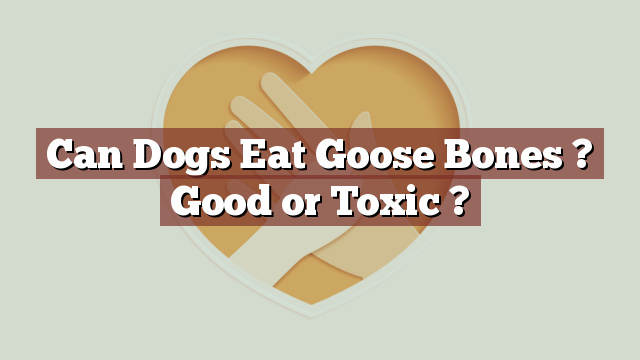Can Dogs Eat Goose Bones? Safe or Toxic?
As responsible pet owners, it is crucial to be aware of the foods that are safe for our furry friends to consume. One food item that often raises questions is goose bones. In this article, we will explore the nutritional value of goose bones, whether they are safe for dogs to eat, any potential risks or benefits associated with feeding goose bones to dogs, and what to do if your dog happens to consume these bones.
Nutritional Value of Goose Bones
Goose bones, like other bones, are primarily composed of calcium and phosphorus. These minerals play a vital role in maintaining strong bones and teeth, supporting proper muscle function, and aiding in various metabolic processes within the body. Additionally, bones can provide mental and physical stimulation for dogs, satisfying their natural urge to chew.
Can Dogs Eat Goose Bones? Safe or Toxic?
Contrary to what some may believe, dogs should not eat goose bones. While dogs have a natural instinct to chew on bones, it is important to note that not all bones are safe for them. Goose bones, specifically, can pose a significant risk to dogs’ health. The bones are small, brittle, and have sharp edges that can splinter easily. These splintered bones can cause serious injuries to the mouth, throat, and digestive system if ingested.
Veterinary professionals consistently advise against feeding dogs any type of poultry bones, including goose bones. The risk of choking, gastrointestinal blockages, or perforation of the intestines is simply too high to justify the potential benefits.
Potential Risks or Benefits of Feeding Goose Bones to Dogs
The potential risks associated with dogs consuming goose bones far outweigh any perceived benefits. The sharp edges and splintering nature of these bones can lead to various health issues, including oral injuries, choking hazards, and internal damage. In severe cases, surgery may be required to remove bone fragments or to repair internal injuries caused by these bones.
While some may argue that chewing on bones can help clean dogs’ teeth and provide them with mental stimulation, safer alternatives are available. Various dog-friendly chew toys, dental treats, and bones specifically designed for canine consumption can provide the same benefits without the health risks.
What to Do if Your Dog Eats Goose Bones
If you suspect that your dog has ingested goose bones, it is crucial to take immediate action. Contact your veterinarian right away to seek professional advice. Based on your dog’s size, the amount of bone consumed, and their current health condition, the veterinarian will guide you on the necessary steps to take.
In some cases, the vet may recommend inducing vomiting under their supervision to eliminate the bones from your dog’s system. They may also suggest monitoring your dog closely for any signs of distress, such as difficulty breathing, vomiting, or changes in behavior. Prompt medical attention is essential to prevent any complications that may arise from the ingestion of goose bones.
Conclusion: Dogs Should Avoid Eating Goose Bones
In conclusion, dogs should never be fed goose bones. The potential dangers associated with these bones, including choking hazards, intestinal blockages, and internal injuries, far outweigh any benefits they may provide. It is crucial to prioritize the well-being and safety of our four-legged companions by offering them alternative, safe chew toys and treats specifically designed for their consumption. If your dog accidentally ingests goose bones, seek immediate veterinary assistance to ensure their health and well-being. By being cautious about the foods we offer our dogs, we can help them live long, healthy lives free from unnecessary risks.
Thank you for investing your time in exploring [page_title] on Can-Eat.org. Our goal is to provide readers like you with thorough and reliable information about various dietary topics. Each article, including [page_title], stems from diligent research and a passion for understanding the nuances of our food choices. We believe that knowledge is a vital step towards making informed and healthy decisions. However, while "[page_title]" sheds light on its specific topic, it's crucial to remember that everyone's body reacts differently to foods and dietary changes. What might be beneficial for one person could have different effects on another. Before you consider integrating suggestions or insights from "[page_title]" into your diet, it's always wise to consult with a nutritionist or healthcare professional. Their specialized knowledge ensures that you're making choices best suited to your individual health needs. As you navigate [page_title], be mindful of potential allergies, intolerances, or unique dietary requirements you may have. No singular article can capture the vast diversity of human health, and individualized guidance is invaluable. The content provided in [page_title] serves as a general guide. It is not, by any means, a substitute for personalized medical or nutritional advice. Your health should always be the top priority, and professional guidance is the best path forward. In your journey towards a balanced and nutritious lifestyle, we hope that [page_title] serves as a helpful stepping stone. Remember, informed decisions lead to healthier outcomes. Thank you for trusting Can-Eat.org. Continue exploring, learning, and prioritizing your health. Cheers to a well-informed and healthier future!

